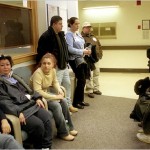 The vocal muscle, for sixty years my reliable alter ego, is failing. Communication, performance, assertion: these are now my weakest assets. Translating being into thought, thought into words, and words into communication will soon be beyond me and I shall be confined to the rhetorical landscape of my interior reflections. Read more
The vocal muscle, for sixty years my reliable alter ego, is failing. Communication, performance, assertion: these are now my weakest assets. Translating being into thought, thought into words, and words into communication will soon be beyond me and I shall be confined to the rhetorical landscape of my interior reflections. Read more
Category Archives: Health & Medicine
Check out this medical blog
 I have a post today at the blog KevinMD. … “An exemplary blog that features timely news and opinion of the latest in medicine, bringing in one of the most devoted audiences and keeping thousands of curious minds satisfied with smart and funny writing. While working on his own blog, Kevin has consistently promoted the rest of the medical blogosphere as a useful and reliable source for medical knowledge and opinion.” Read more
I have a post today at the blog KevinMD. … “An exemplary blog that features timely news and opinion of the latest in medicine, bringing in one of the most devoted audiences and keeping thousands of curious minds satisfied with smart and funny writing. While working on his own blog, Kevin has consistently promoted the rest of the medical blogosphere as a useful and reliable source for medical knowledge and opinion.” Read more
Should I stop taking calcium?
 We live in a very anxiety-producing culture. It’s not the inevitability of death that makes us so anxious. That’s a historical constant. It’s not simply the specifics of turmoil and suffering in the world. Nor is it the underlying insecurity we feel as side-effects of the transition to a global economy. All of those contribute to anxiety, yes. But what exacerbates our condition, in my opinion, is constant exposure to information that ultimately stands to benefit financially from maintaining a state of anxiety. That’s not a good situation. Read more
We live in a very anxiety-producing culture. It’s not the inevitability of death that makes us so anxious. That’s a historical constant. It’s not simply the specifics of turmoil and suffering in the world. Nor is it the underlying insecurity we feel as side-effects of the transition to a global economy. All of those contribute to anxiety, yes. But what exacerbates our condition, in my opinion, is constant exposure to information that ultimately stands to benefit financially from maintaining a state of anxiety. That’s not a good situation. Read more
Afghan women empowered to practice beauty
 The preoccupation with female appearance encourages evaluation of women in terms of sexual attractiveness rather than character, competence, hard-work, or achievement. Although some women benefit from their beauty, it is not a stable form of self-esteem. Read more
The preoccupation with female appearance encourages evaluation of women in terms of sexual attractiveness rather than character, competence, hard-work, or achievement. Although some women benefit from their beauty, it is not a stable form of self-esteem. Read more
Bibi Aisha: Fixing what can be fixed
 I noted that my judgmental reaction to another’s body was shaped by my coincidental assessment that surgeons work on conditions like that. Judgment conflates the body itself with the quality of work done on that body or the potential to have that work done. The possibility of fixing renders inescapable the question of whether or not to fix. Read more
I noted that my judgmental reaction to another’s body was shaped by my coincidental assessment that surgeons work on conditions like that. Judgment conflates the body itself with the quality of work done on that body or the potential to have that work done. The possibility of fixing renders inescapable the question of whether or not to fix. Read more
Mutilated Afghan woman on the cover of Time
 [T]here is an elision here between these women’s oppression and what the U.S. military presence can and should do about it, which in turn simplifies the complexities of the debate and turns it into, “Well, do you want to help Aisha or not?” Read more
[T]here is an elision here between these women’s oppression and what the U.S. military presence can and should do about it, which in turn simplifies the complexities of the debate and turns it into, “Well, do you want to help Aisha or not?” Read more
Bullying, education, and compassion

Radical changes are occurring in what democratic societies teach the young, and these changes have not been well thought through. Thirsty for national profit, nations, and their systems of education, are heedlessly discarding skills that are needed to keep democracies alive. If this trend continues, nations all over the world will soon be producing generations of useful machines, rather than complete citizens who can think for themselves, criticize tradition, and understand the significance of another person’s sufferings and achievements. Read more
Atul Gawande: Modern death and dying
 [O]ur responsibility, in medicine, is to deal with human beings as they are. People die only once. They have no experience to draw upon. They need doctors and nurses who are willing to have the hard discussions and say what they have seen, who will help people prepare for what is to come—and to escape a warehoused oblivion that few really want. Read more
[O]ur responsibility, in medicine, is to deal with human beings as they are. People die only once. They have no experience to draw upon. They need doctors and nurses who are willing to have the hard discussions and say what they have seen, who will help people prepare for what is to come—and to escape a warehoused oblivion that few really want. Read more
Obama appoints Berwick to head CMS
 The obstetrician–gynecologist opposes one of the fundamental assumptions of the new health care law – that physicians should be paid according to the quality of their work, not the quantity. How can you argue against the quality of health care? Burgess spoke on the subject at a recent Health Affairs Media Breakfast:
The obstetrician–gynecologist opposes one of the fundamental assumptions of the new health care law – that physicians should be paid according to the quality of their work, not the quantity. How can you argue against the quality of health care? Burgess spoke on the subject at a recent Health Affairs Media Breakfast:
Burgess came to the defense of the current fee-for-service [FFS] system where the provider is paid for each individual service rendered to a patient. The congressman argued that doctors are “so goal directed that we need that impetus” of FFS as motivation to provide the best possible care. Read more
Links of interest: Can honey combat MRSA?
 The researchers are hopeful that they can build on these initial findings to develop new uses for this potent ingredient in honey, and in light of an alarming trend of antibiotic-resistance, ultimately even put defensin-1 to use as an alternative to current antibiotics. Read more
The researchers are hopeful that they can build on these initial findings to develop new uses for this potent ingredient in honey, and in light of an alarming trend of antibiotic-resistance, ultimately even put defensin-1 to use as an alternative to current antibiotics. Read more
The physician as humanist
 In 1980 the historian G.S. Rousseau expressed concern that modern physicians no longer embodied the humanist tradition of their predecessors. Now that medicine had become overwhelmingly a science rather than an art, he claimed, the interests and accomplishments of physicians had narrowed.
In 1980 the historian G.S. Rousseau expressed concern that modern physicians no longer embodied the humanist tradition of their predecessors. Now that medicine had become overwhelmingly a science rather than an art, he claimed, the interests and accomplishments of physicians had narrowed.
It was not uncommon, for Victorian and Edwardian doctors … to write prolifically throughout their careers. … In twentieth-century America … only the most imaginative physicians can hope for this artistic lifestyle as a consequence of the economic constraints and housekeeping demands placed upon the doctor. Read more
The physician as reader of poetry
 Why My Wife Should Let Me Have a Dog
Why My Wife Should Let Me Have a Dog
If I had a dog his soft fur would not foliate
the sofa or trigger asthma attacks
in my dear wife, ending with a hospital trip,
an adrenaline shot and those inhaler tubes
littering the house. Read more
The physician as poet
because there is this innocent animal,
the body;
because a baby’s unguarded gaze,
and the open regard
of animals both hold patience
with the world,
with mineral fact. Impenetrable
consciousness
arising from, locked into flesh. Read more
The indignity of the waiting room
 I gathered from conversations among those of us waiting that one man had been sitting in reception since 7 am. Well into his 70s, he was clearly nervous, biting his lower lip and muttering silently to himself. Occasionally, he pulled his appointment letter from his bag to double-check the instructions. He walked to the reception desk to ask what had happened. The same careless shrug, with another, “Just take a seat and they’ll call you”. Unable to see a way through this wall of unhelpfulness, he did as he was told. Eventually, he asked a passing nurse for help. She listened and looked him in the eye. But she said that sorry, she could not assist him. He must wait. Read more
I gathered from conversations among those of us waiting that one man had been sitting in reception since 7 am. Well into his 70s, he was clearly nervous, biting his lower lip and muttering silently to himself. Occasionally, he pulled his appointment letter from his bag to double-check the instructions. He walked to the reception desk to ask what had happened. The same careless shrug, with another, “Just take a seat and they’ll call you”. Unable to see a way through this wall of unhelpfulness, he did as he was told. Eventually, he asked a passing nurse for help. She listened and looked him in the eye. But she said that sorry, she could not assist him. He must wait. Read more
Negative knowledge: Remembering Alfred Schutz
 In practice there’s no reason to suspect that any particular piece of information is inadequate before it is revealed to be otherwise. But in theory there’s no reason to exclude anything from suspicion. It is characteristic of all interpretations, meanings, and values that they are never the last word. They are all potentially obsolete. Reality is not just occasionally precarious – it has no permanent foundations whatsoever. It is the nature of knowledge to be fragmentary and partial. This is the first and final, the ultimate source of anxiety.
In practice there’s no reason to suspect that any particular piece of information is inadequate before it is revealed to be otherwise. But in theory there’s no reason to exclude anything from suspicion. It is characteristic of all interpretations, meanings, and values that they are never the last word. They are all potentially obsolete. Reality is not just occasionally precarious – it has no permanent foundations whatsoever. It is the nature of knowledge to be fragmentary and partial. This is the first and final, the ultimate source of anxiety.
Read more
Cultural differences: Emoticons
![]() And what’s the significance of the need to tilt your head to read western QWERTY emoticons, but the eastern ones are looking straight at you? Not what I’d expect culturally. But perhaps the difference here is that the western versions require fewer keystrokes – we’re in more of a hurry.
And what’s the significance of the need to tilt your head to read western QWERTY emoticons, but the eastern ones are looking straight at you? Not what I’d expect culturally. But perhaps the difference here is that the western versions require fewer keystrokes – we’re in more of a hurry.
The Geographic points out that emoticons date back to 1881, when the American magazine Puck published “Typographical Art” for melancholy, indifference, astonishment, and joy. Emotions a bit more subtle than the ubiquitous smiley face, no? Read more
The essential foreignness of another culture
 Look at Korea, he writes. They’ve come around to Western economic ways. They’ve even adopted Western religions. Why does Japan insist on remaining distinctly different? Let’s face it. Western culture is going to dominate the world, and if the Japanese aren’t willing to give up their quaint and antiquated culture, they’ll have no one to blame but themselves.
Look at Korea, he writes. They’ve come around to Western economic ways. They’ve even adopted Western religions. Why does Japan insist on remaining distinctly different? Let’s face it. Western culture is going to dominate the world, and if the Japanese aren’t willing to give up their quaint and antiquated culture, they’ll have no one to blame but themselves.
This strikes me as disrespectful, insulting, and unenlightened. Read more
Links of Interest: Modern Reproduction
 Are the interests of a future child a reason for bringing that child into existence? And is the continuance of our species justifiable in the face of our knowledge that it will certainly bring suffering to innocent future human beings? Read more
Are the interests of a future child a reason for bringing that child into existence? And is the continuance of our species justifiable in the face of our knowledge that it will certainly bring suffering to innocent future human beings? Read more
Links of Interest: Sperm donors, egg donors, and surrogates
Are Sperm Donors Really Anonymous Anymore? (Slate) In an age of sophisticated genetic testing, the concept of anonymity is rapidly fading. With some clever sleuthing—tests that can track down ancestral origins, donor numbers, and bits of biographical information—parents and offspring can find out the donors. “With DNA testing and Google, there’s no such thing as… Read more
My Daddy’s name is donor
What’s it like to have an anonymous sperm donor for a father? Many people think that because these young people resulted from wanted pregnancies, how they were conceived doesn’t matter to them. But … when they are adults, sperm donor offspring struggle with serious losses from being purposefully denied knowledge of, or a relationship with,… Read more
Understanding the Tea Party
National politics may well determine the future of health care. How to make sense of the angry rhetoric coming from the political right. While MSNCB runs antagonizing documentary footage of Joe McCarthy and Pat Buchanan, the New York Times publishes a thought-provoking essay by philosopher J.M. Bernstein. It’s called “The Very Angry Tea Party” (emphasis… Read more
Links of interest: Antibiotic resistance
Rising Plague (Brad Spellberg) Before getting to the numerous recent news items on antibiotic resistance and urinary tract infections, let me quote from Dr. Brad Spellberg’s Rising Plague: The Global Threat from Deadly Bacteria and Our Dwindling Arsenal to Fight Them. (In the following, “community-acquired” means an infection that begins outside a hospital, and fluoroquinolones… Read more
Overuse of antibiotics: A remote study (part 2)
The controversy about the overuse of antibiotics in raising livestock (see the last post) is background for an interesting scientific study that took place in the Galapagos. It looked at the spread of antibiotic resistant strains of bacteria among animals that were totally removed from antibiotics. Would antibiotic resistance become widespread in the absence of… Read more
Overuse of antibiotics: Follow the money (part 1)
Unlike climate change, where there’s a large contingent of denialists who spread doubt about the scientific evidence, no one denies that antibiotic resistance is a problem. There is controversy, however, on the question of just how much the widespread use of antibiotics contributes to the problem. The mechanism is not in dispute: If you expose… Read more
Are some diseases more prestigious than others?
Among medical specialties, some are more prestigious than others. You can generally tell which ones are more prestigious by how well they pay. Surgery and cardiology, for example, rank at the top of the prestige scale. Psychiatry and dermatology are near the bottom. One can also ask if some diseases are considered more prestigious than… Read more
Compression only CPR: Be the Beat
When someone is having a heart attack, bystanders (outside of a hospital) are encouraged to administer life-saving cardio-pulmonary resuscitation (CPR). The traditional form of CPR involves a ratio of 30 chest compressions per minute alternating with two mouth-to-mouth rescue breaths. When I learned CPR, students were provided with a sealed, sterile cloth for covering the… Read more
The esteem of the medical profession: Then and now
Each issue of The Journal of the American Medical Association includes an excerpt from an issue of exactly 100 years ago. (JAMA has been published continuously since 1883.) The May 7, 1910 issue of JAMA included remarks on how much physicians were paid and, by implication, how they were regarded in 2250 B.C. Ability to… Read more
How Big Pharma plans to stay big
The days of exponential growth for the pharmaceutical industry are past. Sales growth has been leveling off since the 1990s. Companies simulate growth by buying smaller companies and firing employees. What will Big Pharma look like as it moves into the future? FierceBiotech provides a summary of a forecast offered by industry expert, Steven Burrill.… Read more
Suicide in Japan (part 2): The Internet and media coverage
There have always been people who wish they were dead, or who have thoughts about voluntary death. But nobody used to be directly encouraged to die. In conventional media, if somebody wrote or said: “I want to die”, the most probable answer was: “Hold on, don’t die!” On the contrary, in the Internet, everybody feels free to write whatever they please under a false name. The moment somebody mentions the intention of committing suicide, original words appear immediately and make their way to the suicide candidate. Horrible words and expressions such as “you are worthless”, “you are dead”, “you don’t deserve to live”, “the world is better off without you” start to appear. … In the Internet’s post modern world, words loose their link with the person responsible for them. … One of the most popular pages for the prevention of suicides had to lower the rule that users only could participate for a maximum 30 minutes, in order to prevent negative emotions from expanding.
Suicide in Japan (part 1): The recession
Some cultural factors exacerbate the problem: lack of religious prohibition against suicide, reluctance to discuss mental health and stress-related problems, a literary tradition that romanticizes suicide, a view of suicide as an honorable act, a way of taking responsibility for failure, among other issues. The breakdown of family and social networks and the increasing isolation of individuals contribute to the problem.




